 Petzlover
Petzlover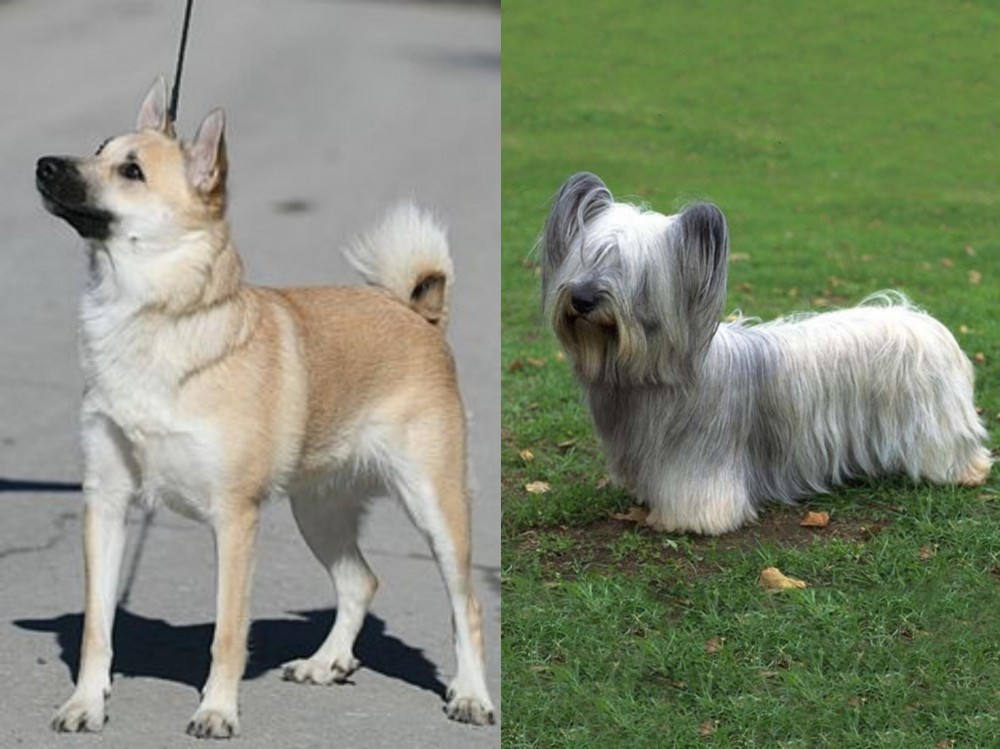 Norwegian Buhund is originated from Norway but Skye Terrier is originated from United Kingdom. Norwegian Buhund may grow 21 cm / 9 inches higher than Skye Terrier. Both Norwegian Buhund and Skye Terrier are of same weight. Both Norwegian Buhund and Skye Terrier has same life span. Both Norwegian Buhund and Skye Terrier has same litter size. Both Norwegian Buhund and Skye Terrier requires Moderate Maintenance.
Norwegian Buhund is originated from Norway but Skye Terrier is originated from United Kingdom. Norwegian Buhund may grow 21 cm / 9 inches higher than Skye Terrier. Both Norwegian Buhund and Skye Terrier are of same weight. Both Norwegian Buhund and Skye Terrier has same life span. Both Norwegian Buhund and Skye Terrier has same litter size. Both Norwegian Buhund and Skye Terrier requires Moderate Maintenance.
 The Norwegian Buhund is a spitz type dog belonging to the herding group of dogs. The dog is related to the Icelandic Sheepdog and the Jämthund.
The Norwegian Buhund is a spitz type dog belonging to the herding group of dogs. The dog is related to the Icelandic Sheepdog and the Jämthund.
This dog breed dates back thousands of years to Nordic Viking times. For centuries these dogs have served working dogs, being herders as well as guardians of flock. Even today in remote parts of Norway, you’ll still find this dog doing farm work.
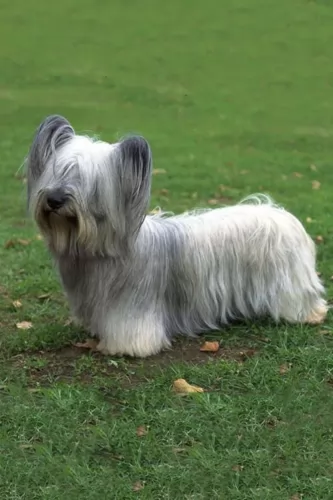 The Skye Terrier is a hardy dog breed and is actually considered to be an endangered native dog breed in the United Kingdom.
The Skye Terrier is a hardy dog breed and is actually considered to be an endangered native dog breed in the United Kingdom.
They were found on the Isle of Skye, although there is some confusion about its history. They were used long ago to hunt but these days they are essentially companion dogs.
They found their way to America and the Skye Terrier Club of America was founded in 1938. The American Kennel Club recognized the breed in 1887.
 The Norwegian Buhund stands at 41 to 47cm in height both male and female. He is a medium sized dog and weighs between 12 and 18kg.
The Norwegian Buhund stands at 41 to 47cm in height both male and female. He is a medium sized dog and weighs between 12 and 18kg.
Known as a herding dog, he is described as being deep chested with a well built, compact body, erect ears and a tail which curves over the back. The head of the dog is wedge-shaped and he has a bright, intelligent look to him.
The coat is essentially a wheaten color but it can be other shades such as a pale cream color to bright orange and sometimes even black. The coat is short to medium in length and he sheds moderately with some seasonal shedding as well.
Fun loving, friendly and social, the Norwegian Buhund is also an active dog who will always be pleading with you for a game or walkies. His pleading brown eyes will hopefully soften your heart towards him so that you give him a ball game or a run in the park. It is why this dog breed gets on well with children – he loves to be playing games with them.
They are such lovable dogs, wanting to spend time with their human family and always ready with a doggy kiss. They want to protect the ones they love and this makes them good watchdogs too, being wary around strangers. He is highly intelligent and will go through training and socialization with ease.
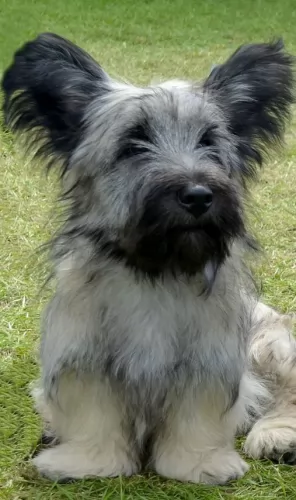 The Skye Terrier is a medium-sized dog standing at between 23 and 26cm in height and weighing between 12 and 18kg. The legs are short and sturdy. He is double coated with the top coat being straight and hard and forming a beard around the face area. The coat can be fawn, and in various shades of grey which are sometimes even black. The ears of the dog are medium sized and erect.
The Skye Terrier is a medium-sized dog standing at between 23 and 26cm in height and weighing between 12 and 18kg. The legs are short and sturdy. He is double coated with the top coat being straight and hard and forming a beard around the face area. The coat can be fawn, and in various shades of grey which are sometimes even black. The ears of the dog are medium sized and erect.
The Skye Terrier has always been a hunting dog and he enjoys quite a bit of exercise – walks, ball games as well as indoor games. Small though he may be, he is strong willed with a mind of his own and will benefit from being trained and socialized.
This is also necessary as he has a fairly reserved nature. He gets on well with children and makes an excellent family pet but he is ready to take on smaller pets in the home. He will bark when confronting strangers and makes an excellent watchdog too.
He is able to adapt well into life in the city or the countryside. He isn’t a dog to be left outside day after day and will just die of boredom, frustration and loneliness.
 He will need exercise on a daily basis. They are lovable dogs and are affectionate towards children in the home. They form strong bonds with their human family.
He will need exercise on a daily basis. They are lovable dogs and are affectionate towards children in the home. They form strong bonds with their human family.
He is a strong willed dog, and will require training and socialization. As a working and herding dog, he wants to be busy, and is perhaps best suited to life in the suburbs or countryside as opposed to living in the city.
He makes an awesome companion dog and he wants to please his human family and be an active part of their lives.
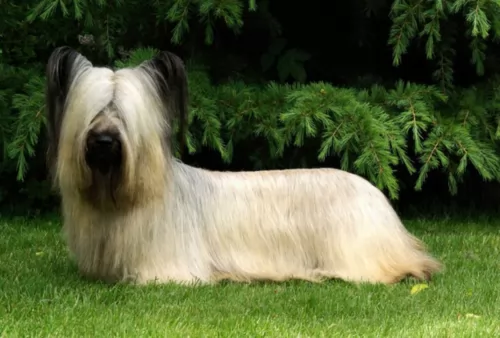 Give the Skye Terrier the attention he wants and he will reward you with his loving companionship.
Give the Skye Terrier the attention he wants and he will reward you with his loving companionship.
He loves the entire family but is best suited to homes where children have been taught to be kind to animals and to treat them with respect.
He has moderate energy levels and will expect you to give him a fair amount of exercise. The Skye Terrier can make an excellent companion for you and your family.
 Provide your Norwegian Buhund with the right care and he can get to 15 years of age. Hip dysplasia is always an issue with dogs and you should be very wary of it as it can cause lameness and pain.
Provide your Norwegian Buhund with the right care and he can get to 15 years of age. Hip dysplasia is always an issue with dogs and you should be very wary of it as it can cause lameness and pain.
Cataracts is another illness that you want to be aware of. Although not painful, this eye aliment can lead to blindness.
Look out for other common dog illnesses such as bloat, skin allergies and cancer.
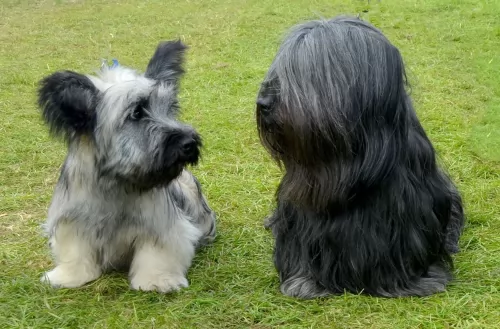 The Skye Terrier is a healthy dog breed. Perhaps the only issue that could be a problem with him is orthopedic problems. He is an achondroplastic dog, meaning a large body on small legs.
The Skye Terrier is a healthy dog breed. Perhaps the only issue that could be a problem with him is orthopedic problems. He is an achondroplastic dog, meaning a large body on small legs.
He could develop spinal problems if he were allowed to constantly be jumping off beds and high chairs.
Orthopedic problems affect the bones, muscles and joints and can actually be debilitating. Orthopedic conditions can be ligament tears or hip dysplasia for instance, accompanied by arthritis.
You’ll notice your dog has an abnormal way of walking or running, inability to get up once lying down and he may have arthritis and pain.Be careful because obesity can trigger problems with the joints and bones.
 You’re going to need to provide this dog of yours with activities that stimulate him physically and mentally. The Norwegian Buhund isn’t a couch-potato type of dog and he doesn’t do well with just lying around. Take him on walks and hikes, throw balls or frisbees for him and buy him some toys that can entertain him. You want to avoid him barking and digging from sheer boredom.
You’re going to need to provide this dog of yours with activities that stimulate him physically and mentally. The Norwegian Buhund isn’t a couch-potato type of dog and he doesn’t do well with just lying around. Take him on walks and hikes, throw balls or frisbees for him and buy him some toys that can entertain him. You want to avoid him barking and digging from sheer boredom.
Like all other spitz-breed dogs, the Norwegian Buhund has a thick double coat, and because he sheds moderately, you will need to brush him at least twice a week. Check simultaneously for ticks and fleas.
Check your pets eye and ears for infection and check his teeth. A rotting tooth at the back of his mouth can be the cause of a lot of pain and problems throughout the body. Keep his nails clipped as well so as to prevent them hooking onto things.
Provide your pet with a nice warm, dry, comfortable place to sleep. If he goes outside, make sure he has a place to lie in the shade or in the sun.
Take your pet to the vet when he appears to be lethargic and sick. Remember to keep his vaccines up to date.
Feed your pet food which is known for its nutritional value. Home made food is a real treat for your pet, but high quality commercially manufactured food can be good and convenient too.
Dogs love simple, consistent diets which don’t upset their stomachs. Boiled chicken, brown rice or pasta, and some vegetables such as sweet potatoes, spinach and carrots chopped up into his food from time to time can be superbly nutritious for your pet. Try and also include a little bit of raw meat occasionally. Always have a bowl of fresh, cool water available to your pet.
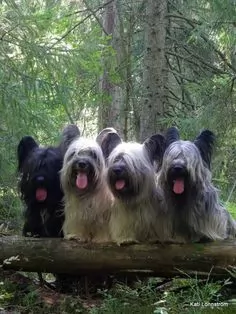 ● The coat of the Skye Terrier is long and silky and will most certainly require brushing every day if you keep the hair long. Such silky hair can easily become matted.
● The coat of the Skye Terrier is long and silky and will most certainly require brushing every day if you keep the hair long. Such silky hair can easily become matted.
● Little dogs like this will need their teeth being checked regularly. You can even try to buy special pet toothpaste and toothbrush and brush his teeth yourself. If you prefer, a professional dog groomer can do this for you and at the same time trim his nails and check his ears and clean the insides of the ears too to avoid infection.
● Provide him with top quality food as the quality of the dog food you buy makes a huge difference to his health and longevity. He is a small dog and there are some excellent commercially manufactured dog foods specially made for small, energetic dogs.
Try to include some home-made food for him which can be simply mixed into the dry kibble twice a week. Boiled chicken, brown rice or pasta and spinach, sweet potatoes and carrots is super tasty and nutritious. Ensure there is always a bowl of fresh, cool water within his reach.
● Keep his vaccines up to date against some deadly canine diseases, and get him to the vet when he shows signs of illness.